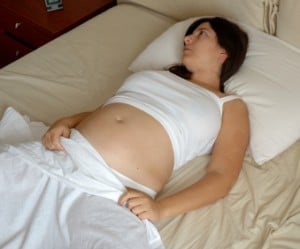 Many people experience night sweats. This is a symptom associated with menopause, thyroid conditions, obesity and pregnancy. Genetics plays a role in the tendency to sweat at night. If you experienced night sweats prior to pregnancy, you may be more likely to have problems when you are pregnant. Make sure you consult with your health care professional.
Many people experience night sweats. This is a symptom associated with menopause, thyroid conditions, obesity and pregnancy. Genetics plays a role in the tendency to sweat at night. If you experienced night sweats prior to pregnancy, you may be more likely to have problems when you are pregnant. Make sure you consult with your health care professional.
How and when night sweats are experienced during pregnancy varies widely. Some women have an occasional episode and wake up soaked with sweat, but sleep uninterrupted most of the time. Others have problems frequently, particularly in the first and third trimesters when hormone fluctuations are most common. For some, the problem is resolved when the baby is born. For others, night sweats may continue in the weeks after the baby is born until the hormone levels gradually return to normal.
Causes of Night Sweats
Hormones are to blame for most of the discomforts and changes in pregnancy and sweating at night is no exception. Lower estrogen levels cause the hypothalamus to function improperly. The hypothalamus is a section of the brain that is responsible for regulating the body’s temperature. Normally, it responds to changes in temperature and releases excess heat in the body through sweat on a hot day.
During pregnancy, changes in estrogen levels can mistakenly be read by the hypothalamus, causing more heat to be produced by the body. This results in sweating to release the heat. The physiological process is similar to what is experienced by women in peri-menopause and menopause.
The biggest problem for women is that night sweats interfere with sleep. You may wake up sweating or shivering because your pajamas are wet. If the sweating is severe, you may need to get up and change your pajamas, or even the bed sheets. This is not only inconvenient, but robs you of precious sleep time.
Minimizing Night Sweats
There are a few things you can do to reduce night sweats. While you probably won’t stop sweating completely, you can take steps to minimize it for a better night’s sleep. If the room is warm, it will make night sweats worse. Turn down the thermostat, open a window, use a fan or turn on the air conditioner, depending on the season and climate where you live.
If you sleep bundled up in blankets and warm pajamas, the heat won’t be able to escape and you will sweat more. Wear lightweight pajamas in a cotton material to help you stay cool. Don’t pile on the blankets. Cotton sheets and light blankets are better for regulating your body temperature and minimizing sweating. Some women find that taking a cool shower at night and then slipping into light pajamas helps to reduce sweating.
Because the heat is coming from inside your body, changes in your sleep environment will only get you so far. But, if you can minimize the sweating – even a little bit – you will get more rest. Keep a fresh nightgown, a towel and a glass of cold water next to your bed. When you do wake up, you will have what you need to quickly cool down and get back to sleep. The goal is to take care of the problem without waking fully, so you can fall back asleep as quickly as possible.
The hypothalamus regulates sleep cycles, in addition to body heat. Getting enough rest is important for proper function of the hypothalamus, as well as the rest of the body. Try going to be at about the same time every night and go to bed early. Pregnant women should be getting eight hours of sleep each night.
Diet and lifestyle factors can contribute to night sweats and making some changes could help minimize the problems. For example, a sedentary lifestyle can increase the severity of night sweats. Conversely, regular exercise supports general health and helps to regulate hormones and the function of the body. This can reduce the frequency of hypothalamus malfunction.
Certain foods can contribute to night sweats, such as spicy foods, alcohol and caffeine. Pregnant women shouldn’t be drinking alcohol anyway, but avoiding caffeinated beverages and spicy foods before bedtime may help to reduce the amount of sweating you experience during sleep.
Sugar is another potential source of problems. Sugar increases the metabolism, which causes the body to generate more heat. Eating sweets before you get ready for bed could trigger the body to create more heat and then release it when you are trying to sleep.
Finally, just as some foods can contribute to night sweats, others can reduce them. Soy is one food source that has been shown to reduce the symptoms of menopause. The soybean is known as a plant estrogen. For this reason, women in peri-menopause or menopause sometimes increase soy consumption.












Add Comment